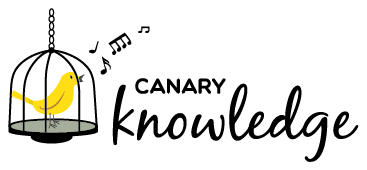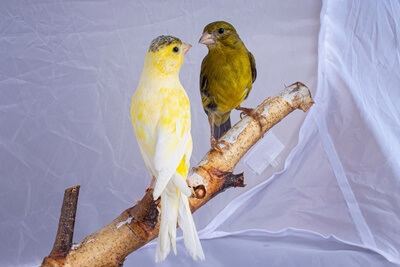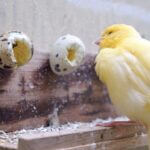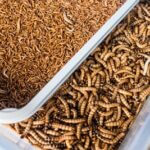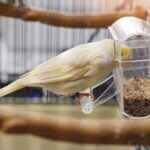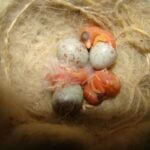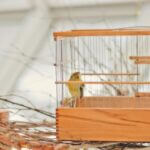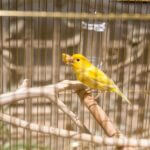Feeding your canary leftover fruit (like bananas, grapes, raspberries, and fresh apples) and vegetables (such as broccoli, kale, and spinach) is strongly recommended.
What’s more, various well-cooked meats and fried eggs are nutritious foods for canaries, primarily due to their high protein and calcium content.
So, if you’ve got some healthy leftover food or fresh kitchen scraps, they may be nutritious for canaries.
Determining the Right Foods for Your Canary
The foods you give your canary should closely resemble the diets of wild canaries because they’re what birds are physiologically adapted to consuming and synthesizing.
The ideal diet for a canary should include:
- Seeds
- Leafy veggies
- Grass seeds
- Berries
According to Biochemistry and Molecular Biology, the protein intake of canaries, especially when younger, should be 16-22% of their diet.
Complete proteins (animal-based) are preferred to incomplete proteins (plant-based) because they contain the whole spectrum of essential amino acids.
10 Human Foods That Are Safe For Canaries
This list was assembled by studying the different foods that canaries eat in the wild. Then, it was compared to various human foods that best match their nutritional value.
The best human foods for canaries include:
Eggs
For a long time, many people believed that eggs had high cholesterol levels and were neither safe for humans nor animals.
With canaries being so sensitive to cholesterol and fats, most owners are still reluctant to feed eggs to their birds.
However, according to Nutrients, eggs have lower cholesterol levels than most protein sources and have high levels of vital nutrients, chief among them being:
- Vitamin B5
- Vitamin D
- Vitamin E
Both the yolk and egg white are also rich in protein, which is essential in rebuilding worn-out tissues and assisting with molts.
Only feed canaries well-cooked eggs in small portions, as uncooked eggs often carry harmful bacteria.
Broccoli
Broccoli is rich in a variety of vitamins and minerals, including:
- Vitamin A
- Vitamin B
- Vitamin C
- Magnesium
- Iron
- Anti-inflammatory properties
These collectively work to strengthen your canary’s immune system.
Broccoli is also rich in fiber (which aids digestion) and folic acid (a key ingredient in DNA formation). The latter characteristic makes the veggie a great addition to the diets of egg-laying canaries.
Canaries can eat either cooked or raw broccoli. However, feeding your canary raw broccoli is recommended, as boiling or frying can kill heat-sensitive nutrients, like vitamin C.
Carrots
Make carrots a key part of your canary’s diet because they contain important minerals, like vitamin K1, fiber, and beta-carotene.
This is the main compound involved in strengthening (or changing) feather colors, making them extremely important if you have a red or red-factor canary.
The benefits of feeding carrots to your canary include:
- Better vision
- A stronger immune system
- Improved digestion
The best way to give carrots to your bird is in raw form. You may grate it and combine it with other foods, or just cut it into small pieces and put it in your canary’s bowl.

Peppers
According to Cell, canaries are indifferent to the effects of capsaicin. So, your canary won’t be uncomfortable when you give it pepper.
Red hot chilies contain high amounts of:
- Vitamin A
- Vitamin B
- Vitamin C
- Iron
- Magnesium
- Potassium
- Cryptoxanthin
All these nutrients are essential to the health of a canary, especially the immune system.
If you have a red-factor canary, red peppers are a food you should feed them often. This will help it achieve a beautiful deep red hue in its feathers.
Like many vegetables, peppers are best eaten raw, although you may choose to cook them alongside other foods. Moreover, their low-fat content makes peppers safe for daily feeding.
Cucumber
Cucumbers contain high amounts of water and have a low-calorie count.
So, giving a few pieces of cucumber to your canary every other day is a good way of keeping it hydrated. That is, without increasing the canary’s weight and blood sugar levels.
Offer the cucumber in raw and unpeeled form because cooking and peeling reduce the amount of nutrients available.
Meat
The type of protein in meat is complete, meaning it is easily digested and synthesized.
Aside from muscle and tissue building, meat’s complete protein and amino acids promote bone health. The latter is key to maintaining the canary’s weight at a healthy level.
Other benefits include better iron absorption and hastened metabolism.
Admittedly, meat doesn’t contain a large variety of nutrients and should only be consumed together with other foods. Furthermore, the portions you give to your canary should be small.
Coconut Milk
If you’re drinking coconut milk, or have some in your fridge, offer some to your canary.
Unlike cow’s milk, which is hard for canaries to digest due to lactose, coconut milk poses no such problems. Furthermore, it’s arguably the most nutritious type of milk for canaries.
Coconut milk has high amounts of lauric acid, which has antioxidant and anti-inflammatory properties. The sodium found in the milk promotes nerve and muscle health and helps regulate body fluids.
However, since coconut milk contains a high amount of fat, it shouldn’t be a regular meal for your canary. Rather, it should be a once or twice a week treat.
Rice
Rice is safe as long as it’s well cooked. Uncooked rice is dangerous for canaries since their throats are very small and are unsuitable for hard grains.
The main benefit of rice is its low-fat content, which means you can give it to the canary regularly. Still, rice contains only carbs and low amounts of fiber and protein.
If you choose to make it a regular part of the canary’s diet, it should be accompanied by vegetables, fruits, and seeds to provide other nutrients.
Brown rice is more nutritious and healthier for canaries, as it’s usually not stripped of its germ and bran. These are the most nutritious parts of a rice grain.
Bananas
Bananas are a healthy fruit to share with your canary once in a while. The vitamins and minerals present in bananas include:
- Vitamin A
- Potassium
- Vitamin B6
- Vitamin C
Vitamin A controls the development of the beak and nails. Vitamin C boosts immunity. Meanwhile, vitamin B6 is a major component of blood and aids in fat, carbohydrate, and protein metabolism.
The best way to feed a banana to a canary is by hand. Peel off the skin, hold the banana up, and prompt the canary to come and take a bite.
Due to their high sugar content, bananas should only be an occasional treat.
Apples
Among the nutrients present in large concentrations in apples are:
- Fiber
- Vitamin C
- Antioxidants
- Phytochemicals, such as quercetin and chlorogenic acid
The large amounts of antioxidants in apple fights antioxidants. The fiber content also boosts sugar absorption, which helps ward off diabetes.
Don’t peel apples when giving them to your canary because the skin holds most of the fiber. If you have any safety concerns, wash the fruit under running water.
Ensure that any apple you feed your canary doesn’t contain seeds because they’re toxic to canaries.
What Kind of Human Food Can Baby Canaries Eat?
Baby canaries require high-protein diets in the first few weeks to assist with tissue and body development. At this time, you should feed them animal proteins (preferably cooked eggs) and lean meat.
However, they also need the full range of nutrients, and about 20% of their diets should be fruits and veggies. Breadcrumbs and fine corn meal are other foods you can give your canary.
Human foods can be a good addition to a canary’s diet. If you determine that the food isn’t harmful to a canary’s system, incorporate it sparingly into its diet.
